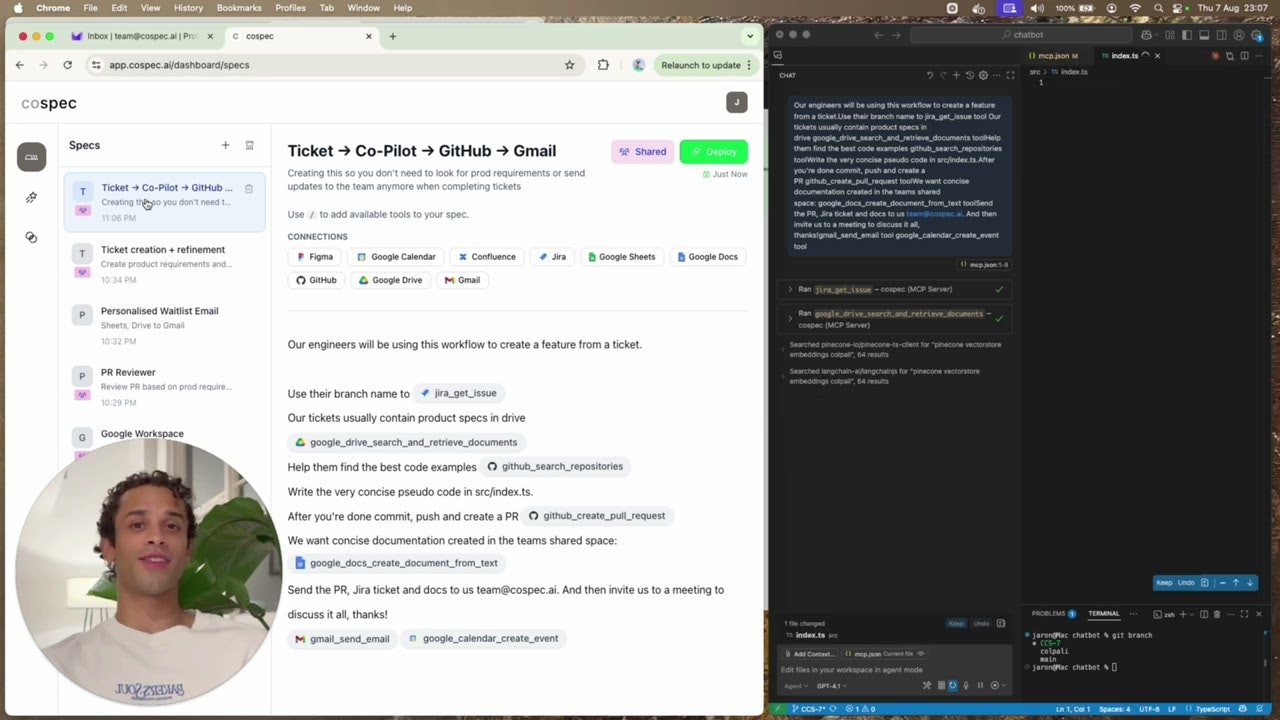Table of Contents
Overview
In the rapidly evolving world of AI agents, teams need a streamlined way to connect data, define agent behaviors and deploy standardized servers without writing code. cospec is a no-code IDE founded by Jaron Escoffery and launched on Product Hunt in August 2025. It lets you link data from any platform, author specification-based workflows and deploy unified Model Context Protocol (MCP) servers for your AI agents—all through a simple interface that bridges complex AI systems and real business applications.
Key Features
cospec provides end-to-end AI agent development tools designed for speed, security and collaboration.
- No-code IDE: Author AI agent workflows using written specifications instead of visual drag-and-drop, enabling precise, version-controlled definitions.
- Universal Connectivity: Secure OAuth integrations with major platforms (Google, Atlassian, Figma and more) let agents access enterprise data across CRM, project management and design tools.
- Automated Orchestration: Define multi-step processes once—cospec ensures your AI agents carry out complex tasks across connected systems without manual coordination.
- MCP Server Deployment: Instantly generate and deploy compliant MCP servers that expose your workflows to clients like Claude, VS Code and Cursor, ensuring consistent runtime environments.
- Enterprise Collaboration: Share specs, manage organization-level permissions and perform unlimited deployments via the Business plan, keeping teams aligned and secure.
- Built-in Testing \& Simulation: Preview and debug workflows in a sandbox environment with real-time logs before pushing to production.
How It Works
- Connect Data Sources
Use secure OAuth 2.1 authentication to link your Google, Atlassian, Figma and other accounts. Tokens are encrypted with enterprise-grade security. - Write Specifications
Draft “specs” that describe what actions AI agents should perform, when and on which data. The written format supports branching logic, loops and error handling. - Simulate \& Debug
Run specs in a sandbox to validate workflows, inspect logs and refine behavior without impacting live systems. - Deploy MCP Servers
One click generates a unified MCP server hosting your specs. Follow detailed guides to integrate with Claude, VS Code, Cursor or any MCP-capable client. - Monitor \& Iterate
Track deployment status, review execution logs and update specs as requirements evolve. Teams can collaborate on spec versions and roll back changes as needed.
Use Cases
cospec powers AI agent scenarios across diverse business functions:
- Rapid Prototyping \& Deployment: Spin up AI agents for customer support, report generation or sales outreach in hours instead of weeks.
- Cross-Platform Data Automation: Orchestrate end-to-end processes spanning CRM, ticketing systems and BI tools without custom connectors.
- Democratized AI Development: Enable non-technical analysts and business users to create, test and deploy agent workflows without IT involvement.
- MCP-Compliant Integrations: Build reusable MCP servers that work out of the box with multiple AI clients, protecting your workflows from vendor lock-in.
- Continuous Improvement: Leverage sandbox testing and real-time logs to refine agent behaviors, ensuring reliability for mission-critical tasks.
Pros \& Cons
Advantages
- Accessible No-Code Platform enables domain experts to craft sophisticated AI behaviors without programming.
- Robust Data Ecosystem supports secure OAuth connections to virtually any enterprise tool.
- Standards-First MCP Support guarantees interoperability with leading AI clients and future-proofs your workflows.
- Team Collaboration \& Governance through shared specs, role-based access and unlimited deployments.
- Sandbox Testing \& Monitoring provides confidence before production rollout.
Disadvantages
- Emerging Platform with a shorter track record compared to established RPA and workflow tools.
- Specification-Driven Model may require users to adapt from visual builders to a text-based approach.
- MCP Adoption Required—value grows as more AI clients support MCP, though key integrations are already in place.
- Business Plan for Teams—advanced collaboration features require upgrading from the free Developer tier.
How Does It Compare?
No-Code Workflow Builders
| Service | Highlight |
|---|---|
| n8n | Open-source, self-hosted automation with extensible modules |
| Zapier | Vast app ecosystem with AI-enhanced actions |
| Make (formerly Integromat) | Visual scenario builder with advanced conditional logic |
| Microsoft Power Automate | Deep integration within Microsoft 365 and Azure |
| Langflow | Visual orchestration for custom LangChain AI pipelines |
| cospec | Specification-based AI agent workflows + MCP server support |
AI Agent Development Platforms
| Service | Highlight |
|---|---|
| Vertex AI Agent Builder | Google Cloud native multi-agent orchestration |
| IBM Watson Assistant | Enterprise conversational AI with analytics |
| Microsoft Copilot Studio | Agent building integrated into Microsoft tools |
| cospec | No-code spec IDE for MCP-compliant agent workflows |
Enterprise AI/ML Platforms
| Service | Highlight |
|---|---|
| DataRobot | Automated ML pipelines with governance and MLOps |
| AWS AI Services | Scalable foundation models and AI tooling |
| Azure AI Studio | Full AI development suite within Azure ecosystem |
| cospec | Focused on AI agent orchestration and MCP compliance |
MCP-Specific Tools
| Service | Highlight |
|---|---|
| Claude Desktop | Native MCP client for interactive AI workflows |
| VS Code MCP Extension | Inline MCP integration in your editor |
| Cursor | MCP-enabled scripting environment for code and data |
| cospec | Creator of MCP servers from no-code specifications |
Final Thoughts
cospec represents a significant step toward making AI agent development accessible, secure and standards-compliant. By combining a no-code spec IDE with automated MCP server deployment, sandbox testing and enterprise collaboration features, it empowers teams to build and manage sophisticated AI workflows without traditional development overhead. As MCP adoption grows and more client integrations appear, cospec’s focus on interoperability and business-friendly tooling makes it a valuable asset for organizations seeking to operationalize AI agents at scale.
